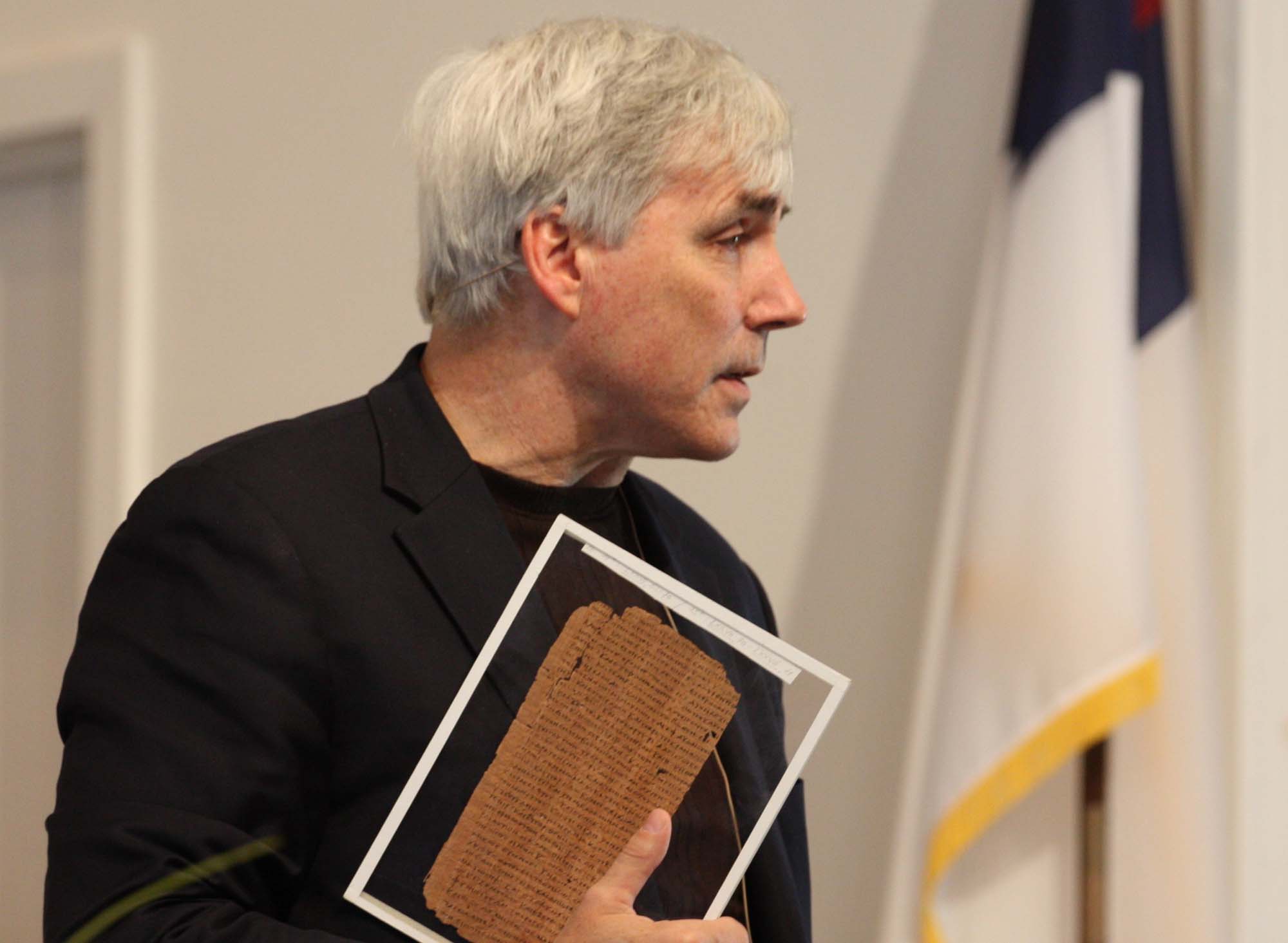
KANSAS CITY, Mo. — Midwestern Baptist Theological Seminary officials have announced a partnership with the Green Scholars Initiative offering MBTS’ ancient language students opportunities to research and publish their findings about one of the world’s oldest biblical texts that dates to the second century.
 Over the next 10-12 years, Midwestern biblical language professors and students will research, analyze and publish information from the earliest Greek texts of the book of Psalms, part of a collection known as the Bodmer Papyri.
Over the next 10-12 years, Midwestern biblical language professors and students will research, analyze and publish information from the earliest Greek texts of the book of Psalms, part of a collection known as the Bodmer Papyri.
MBTS’ research will begin with the Papyrus Bodmer 24 (P24), which was officially presented to Midwestern by Green Collection director Scott Carroll during the seminary’s Feb. 2 faculty meeting. Midwestern subsequently will receive one papyrus leaf of the text from Psalms 17-119 approximately every two months until all 50 leaves are completed. This papyrus is approximately dated to the late second century.
“Midwestern is honored and humbled to team up with the Green family, Dr. Scott Carroll [Green Collection director], Dr. Jerry Pattengale [Green Scholars Initiative director] and the GSI staff on this project,” said Phil Roberts, who subsequently left the Midwestern presidency in February. “Much of what is purchased and acquired for the Green Collection will not see the light of day for years because a lot of it relates to biblical scholarship and research. That’s where Midwestern Seminary comes in. We’ll be helping to carry forth the process of examining, evaluating, writing and publishing about many of the findings involved with these documents.”
Roberts, in announcing the partnership, said the project is at the “cutting edge” in biblical scholarship “in terms of the amount of resources and energy behind it and the focus of involving the whole community of faith, including Midwestern Seminary.”
Heading up the project at Midwestern will be Stephen Andrews, professor of Old Testament, Hebrew and archaeology. Other members of the seminary’s biblical languages faculty also will be involved. Three to five students from the school’s biblical languages degree program tracks per scholar will work on the project.
According to its website, the Green Scholars Initiative is an international research project involving dozens of institutions under the auspices of The Green Collection, the world’s newest and largest private collection of rare biblical texts and artifacts. Through thousands of cuneiform texts and papyri, Dead Sea Scrolls and Coptic texts to Wycliff, Tyndale, Erasmus, King James and a litany of Reformation and post-Reformation original texts, the Green Scholars Initiative brings established and young scholars together to pioneer groundbreaking biblical discoveries.
“The Green Scholars Initiative is revolutionizing the undergraduate research experience for generations of students, making advanced biblical research more accessible than ever before in partnership with 10 senior scholars and their research clusters,” said Scott Carroll, also a research professor at Baylor University, during the MBTS faculty meeting. “Preliminary studies of ancient, undocumented papyri and other manuscripts have already uncovered early Christian Scriptures and lost copies of Greek classics.”
Carroll also noted that the way the GSI operates is novel in the current scholarly environment. “The Green Scholars Initiative flips the traditional paradigm, which is: leading institutions controlling ancient documents and doling them out to whomever they want, or you come to them and work by their terms,” Carroll said. “We thought, ‘What if these things were entrusted in the hands of excellent scholars and mentors and democratized, distributed around the country?’ When the entire thing is up and running, then hundreds of students will be involved and impacted by this process. This will raise up a generation of capable young scholars who are invigorated and excited about studying these things.”
The Bodmer Papyri were discovered in Egypt in 1952, encompassing various forms of Coptic, Greek and Latin papyri dating from the second to the seventh centuries CE, including biblical texts, Christian writings and pagan literary texts. Since most of the manuscripts in the find were acquired by Martin Bodmer, they are referred to collectively as the Bodmer Papyri, although they are housed in other collections, both public and private.
–30–
T. Patrick Hudson is director of communications at Midwestern Baptist Theological Seminary.















